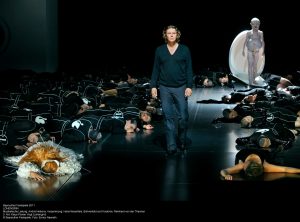‘Kinder!, macht Neues!, Neues!, und abermals Neues!’ schreef Wagner aan Franz Lizt. En na de allereerste Festspiele concludeerde hij dat volgend jaar alles anders moest. Zelfs een geheel nieuw theater achtte hij niet uitgesloten.
Het Festspielhaus staat er nog steeds. Grotendeels van hout en daarmee de nachtmerrie van elke brandweerman in het ietwat suffige Duitse provinciestadje, dat ondanks een universiteit en enkele hoogwaardige technologiebedrijven haar wereldfaam dankt aan de geniale megalomaan die op een groene heuvel het theater liet bouwen voor zijn opera’s. Op kosten van de staat, met dank aan Ludwig II.
Een theater dat, vier generaties later, weliswaar niet meer in het bezit is van de familie Wagner, maar nog altijd strak geleid wordt door inmiddels de achterachterkleindochters van de componist. Akoestiek en onzichtbare orkestbak zijn nog altijd onovertroffen, en er klinkt nog altijd louter Wagner.
Kaartjes? Vergeet het maar. Het is een waar bedevaartsoord, waar je iedere zomer Angela Merkel naast pakweg Michael Schumacher ziet staan. Elke uitvoering is van de eerste tot de laatste stoel stijf uitverkocht. De prijzen vallen mee, maar de wachtlijst is lang. Wie zich nu inschrijft, kan zo tegen 2022 de pelgrimage naar Bayreuth maken.
Tradities slijten langzaam, zeker in Bayreuth. Maar zie: bij de honderdste editie van het festival een noviteit. Radio is er al sinds mensenheugenis bij, camera’s snorren ook al jaren voor video- en dvd-producties, maar rechtstreeks, op een publieke televisiezender? Daarop moesten we wachten tot 14 augustus 2011. Je zou denken dat uitverkoren zender Arte groots zou uitpakken, in de geest van de meester. De opera-uitzending van de toekomst, een waar multimediaal Gesammtkunstwerk. Maar niets van dat alles. Een korte introductie, en hup, de opera live. Of wacht, nee, dat juist niet.
Live bleek namelijk niet echt live te zijn. In Bayreuth begint elke voorstelling sinds mensenheugenis stipt om vier uur. Dat vroege aanvangstijdstip heeft een reden. Je hebt lange opera’s, hele lange opera’s en dan heb je Wagner. In Bayreuth neemt men er daarom echt de tijd voor met pauzes waarin je een driegangen diner kunt nuttigen. Pauzes die Arte prima had kunnen vullen met achtergrondinformatie, een eerder opgenomen gesprek met de regisseur, gezellig gekeuvel vanaf de groene heuvel of desnoods een aardig kookprogramma. De kijker moet immers ook eten. De zender verkoos echter de eerste twee bedrijven met vijf kwartier vertraging uit te zenden, om pas het laatste deel werkelijk rechtstreeks uit te zenden.
Op het moment dat het Festspielhaus al bijna leegstroomt voor de eerste pauze, horen we de eerste noten. We zien Lohengrin, we zien de Brabantse edelen, in de enscenering van Hans Neuenfels ratten in een mislukt laboratoriumexperiment, en de opkomst van Elsa, en dan… totale duisternis. Er volgt wat reclame voor de zender, dan beelden van Jonas Kaufmann die hartverscheurend mooi een aria zingt. Prachtig, maar Kaufmann zong vorig jaar de titelrol en bovendien horen we toch echt Mozart. Na een aantal minuten lezen we dat er technische problemen met de verbinding met Bayreuth zijn. Er volgt nog wat meer Kaufmann, en dan schakelen we abrupt weer naar Bayreuth, uiteraard nog steeds niet rechtstreeks.
Om dat uiteindelijk toch te kunnen doen, worden de pauzes nog korter. Nazorg ontbreekt eveneens. Het applaus wordt bruut afgebroken en we rollen meteen in een documentaire over Rienzi, uitgerekend een Wagner-opera die op last van de meester nooit in Bayreuth wordt uitgevoerd. Een mooie documentaire, dat dan weer wel. Maar volgend jaar moet alles anders.


